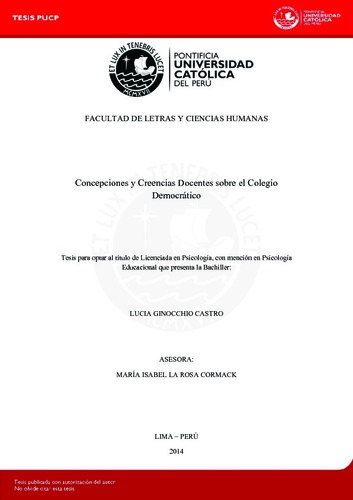| dc.contributor.advisor | La Rosa Cormack, María Isabel | es_ES |
| dc.contributor.author | Ginocchio Castro, Lucia | es_ES |
| dc.date.accessioned | 2014-10-02T14:41:56Z | es_ES |
| dc.date.available | 2014-10-02T14:41:56Z | es_ES |
| dc.date.created | 2014 | es_ES |
| dc.date.issued | 2014-10-02 | es_ES |
| dc.identifier.uri | http://hdl.handle.net/20.500.12404/5607 | |
| dc.description.abstract | El proceso de construcción de la democracia en el colegio tiene como actor principal al docente,
cuyas concepciones y creencias influirán en su práctica pedagógica. Por este motivo, el presente
estudio tuvo como propósito explorar las concepciones y creencias de los docentes sobre el
colegio democrático. Se entrevistó a ocho profesores de una institución educativa pública
secundaria. Los resultados mostraron que ellos no reconocen la construcción de una sociedad
democrática como fin de la educación, sino que perciben que su objetivo principalmente es
formar emprendedores y personas preparadas para el mundo laboral. Si bien mencionan el
desarrollo de habilidades y la formación integral como fines de la educación, estos no se dirigen
al desarrollo de la ciudadanía de sus estudiantes. La mayoría comprende la democracia
principalmente como un sistema de gobierno, algunos solamente como una forma de vida y
otros mencionan ambas. Además, piensan que esta es blanda, no sabe aplicar normas, que en
democracia la libertad de expresión se tergiversa y que los políticos se aprovechan de la
ignorancia del pueblo para conseguir votos. En el colegio la democracia se entiende
principalmente como participación en programas escolares para la democracia o en acciones
centradas en el docente. Los profesores consideran que las familias no contribuyen con la
formación de los estudiantes, que el colegio no puede hacer nada por los estudiantes con
familias problemáticas y que los alumnos llegan con muchas limitaciones que dificultan la
enseñanza y el aprendizaje. Además, sus creencias sobre su rol como docentes los distancian de
posturas democráticas. Sobre disciplina y métodos correctivos se encuentra poca claridad y
frustración en los profesores. La mayoría está de acuerdo con la participación de alumnos en la
elaboración de normas, pero con límites y guía del docente. | es_ES |
| dc.description.abstract | Teachers are principal actors in the process of building democracy in school, while their
conceptions and beliefs have influence in their pedagogical practice. Therefore, the aim of the
present study was to explore teacher’s conceptions and beliefs about democratic schools. Eight
public secondary school teachers where interviewed for the study. Results show that teachers do
not recognize that building a democratic society is one of the aims of education. Instead, they
perceive entrepreneurship and educating for the work world as its principal aims. Even though
they mention development of abilities and integral training, these are not directed to the
development of citizenship in their students. The majority of teachers understand democracy
only as a government system, others just as a way of living and some mention of these
characteristics. Also, they think that democracy is weak, do not apply rules, in democracy
freedom of expression is misunderstood and politicians take advantage of peoples ignorance to
get votes. In school, democracy is understood principally as involvement in school programs for
democracy or teacher centered actions. Teachers consider families can’t contribute to student’s
education, school can’t do anything for students with problematic families and that they arrive
to school with several limitations that make difficult teaching and learning. Additionally, they
hold beliefs about teacher’s role that distance them from democratic stances. Little clarity and
frustration was found in relation to discipline and corrective methods. The majority of teachers
agree with student’s participation in the creation of rules, but with limits and teacher’s guide. | es_ES |
| dc.language.iso | spa | es_ES |
| dc.publisher | Pontificia Universidad Católica del Perú | es_ES |
| dc.rights | Atribución-NoComercial-SinDerivadas 2.5 Perú | * |
| dc.rights | info:eu-repo/semantics/openAccess | es_ES |
| dc.rights.uri | http://creativecommons.org/licenses/by-nc-nd/2.5/pe/ | * |
| dc.subject | Creencia y duda | es_ES |
| dc.subject | Personal docente--Aspectos psicológicos | es_ES |
| dc.subject | Educación ciudadana. | es_ES |
| dc.title | Concepciones y creencias docentes sobre el colegio democrático | es_ES |
| dc.type | info:eu-repo/semantics/bachelorThesis | es_ES |
| thesis.degree.name | Licenciado en Psicología Educacional | es_ES |
| thesis.degree.level | Título Profesional | es_ES |
| thesis.degree.grantor | Pontificia Universidad Católica del Perú. Facultad de Letras y Ciencias Humanas | es_ES |
| thesis.degree.discipline | Psicología Educacional | es_ES |
| renati.discipline | 313046 | es_ES |
| renati.level | https://purl.org/pe-repo/renati/level#tituloProfesional | es_ES |
| renati.type | http://purl.org/pe-repo/renati/type#tesis | es_ES |
| dc.publisher.country | PE | es_ES |
| dc.subject.ocde | http://purl.org/pe-repo/ocde/ford#5.01.00 | es_ES |






